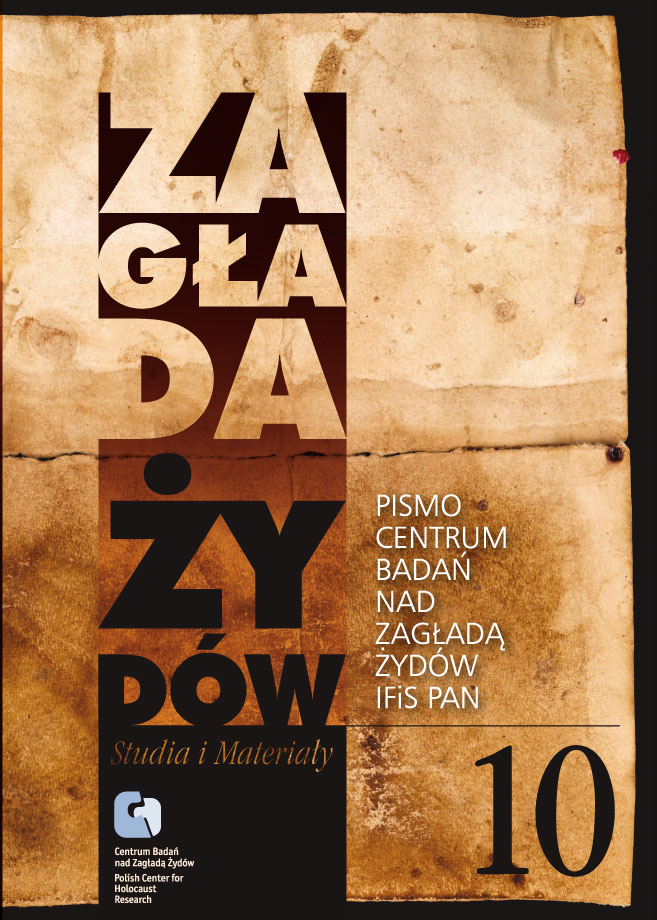Czy prawda nas wyzwoli? Przełamywanie oporu psychologicznego w przyjmowaniu wiedzy o Zagładzie
Zagłada Żydów. Studia i Materiały, Nr 10 (2014), Strony: 803-822
Data zgłoszenia: 2020-10-26Data publikacji: 2014-12-01
 https://doi.org/10.32927/ZZSiM.549
https://doi.org/10.32927/ZZSiM.549
Abstrakt
The introduction of the programs on Holocaust education in Poland and a broader debate on the transgressions of Poles against the Jews have not led to desired improvement in public knowledge on these historical events. A comparison of survey results from the last two decades (Bilewicz, Winiewski, Radzik, 2012) illustrates mounting ignorance: the number of Poles who acknowledge that the highest number of victims of the Nazi occupation period was Jewish systematically decreases, while the number of those who think that the highest number of victims of the wartime period was ethnically Polish, increases. Insights from the social psychological research allow to explain the psychological foundations of this resistance to acknowledge the facts about the Holocaust, and indicate the need for positive group identity as a crucial factor preventing people from recognizing such a threatening historical information. In this paper we will provide knowledge about the ways to overcome this resistance-through-denial. Implementation of such measures could allow people to accept responsibility for the misdeeds committed by their ancestors.
Słowa kluczowe
stosunki polsko-żydowskie , teoria tożsamości społecznej , opór psychologiczny
Licencja
Prawa autorskie (c) 2014 Autor&"Zagłada Żydów. Studia i Materiały"

Utwór dostępny jest na licencji Creative Commons Uznanie autorstwa 4.0 Międzynarodowe.
https://creativecommons.org/licenses/by/4.0
Czasopismo publikowane jest w standardzie Diamond Open Access na licencji CC-BY-4.0 Deed - Uznanie autorstwa 4.0 Międzynarodowa - Creative Commons
Inne teksty tego samego autora
- Michał Bilewicz, Nie tylko o „Strachu”. Psychologia potocznego rozumienia historii , Zagłada Żydów. Studia i Materiały: Nr 4 (2008)
- Michał Bilewicz, Karolina Marcinkowska, Społeczna psychologia Holokaustu: od naiwnego sytuacjonizmu do zrozumienia roli ideologii , Zagłada Żydów. Studia i Materiały: Nr 20 (2024)
Podobne artykuły
- Dariusz Libionka, Największe zmartwienie „polskich patriotów” , Zagłada Żydów. Studia i Materiały: Nr 5 (2009)
- Jakub Petelewicz, In memoriam Raul Hilberg (1926–2007) , Zagłada Żydów. Studia i Materiały: Nr 3 (2007)
- Romuald Jakub Weksler-Waszkinel, Jak Pawłowski ukrywał Grinera [Sługa Mesjasza. Z ks. Grzegorzem Pawłowskim/Jakubem Herszem Grinerem rozmawia Lucyna Montusiewicz, Lublin, wyd. Gaudium 2005] , Zagłada Żydów. Studia i Materiały: Nr 1 (2005)
- Łukasz Biedka, Pamiętnik Cesi Gruft "W Imię Boże!" , Zagłada Żydów. Studia i Materiały: Nr 5 (2009)
- Barbara Engelking, „...Zupełnie zdani jesteśmy na nich...” Relacja ratujących z ukrywanymi na przykładzie dziennika Feli Fischbein , Zagłada Żydów. Studia i Materiały: Nr 4 (2008)
- Aleksandra Bańkowska, Polish Partisan Formations during 1942–1944 in Jewish Testimonies , Zagłada Żydów. Studia i Materiały: 2008: Holocaust Studies and Materials
- Karolina Panz, Zagłada sztetl Grice , Zagłada Żydów. Studia i Materiały: Nr 3 (2007)
- Michał Głowiński, Błoński’s Essay Years Later , Zagłada Żydów. Studia i Materiały: 2008: Holocaust Studies and Materials
- Barbara Engelking, “We are competely dependent on them . . .” – relations between the helpers and the hiding as exemplified by Fela Fischbein’s diary , Zagłada Żydów. Studia i Materiały: 2010: Holocaust Studies and Materials
- Martyna Grądzka-Rejak, „Od dłuższego czasu straciłem wszelki kontakt z żydami i żydostwem”. Neofici w okupowanym Krakowie w świetle materiałów Archiwum Kurii Metropolitalnej w Krakowie , Zagłada Żydów. Studia i Materiały: Nr 13 (2017)
<< < 1 2 3 4 5 6 7 8 9 10 11 12 13 14 15 16 17 18 19 20 21 22 23 24 25 26 27 28 > >>
Możesz również Rozpocznij zaawansowane wyszukiwanie podobieństw dla tego artykułu.
 English
English
 Język Polski
Język Polski



 https://orcid.org/0000-0001-5027-1691
https://orcid.org/0000-0001-5027-1691





